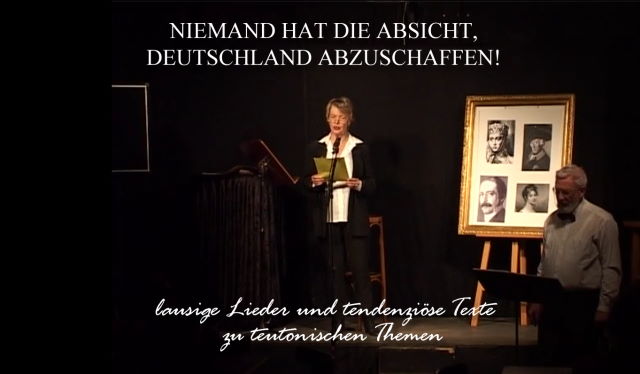On Christmas Eve 1979 Rudi Dutschke died from the consequences of the attempt on his life on Maundy Thursday 1968. The 3rd of January 2005 marks the 25th anniversary of his burial in Berlin-Dahlem.
As with Jesus of Nazareth, the community of Rudi of Luckenwalde is realising the fact that it had encountered a redemptive-historical individual only a long time after his death. An individual is of redemptive-historical nature if he has created a hinge on which a new world history turns, one which will be concentrated and expressed by new world-historical individuals. “For as a morning breeze are the names / Since Christ. Become dreams. Fall like error / Upon the heart, killing, if not one / Ponders what they are and understands.” (Hölderlin)
Hitler and Dutschke were the two charismatic leaders the German People brought forth in the 20th century: Hitler the leader (Führer) of the great German workers’ and people’s movement of 1933, Dutschke the leader of the small German students’ movement of 1968. Of the numerous student leaders of the world revolution of 1968, not one had the Jesus-like format, personal charisma and philosophical depth of Rudi Dutschke. He was endowed with all this because he was the Führer after the Führer. Heinrich Böll referred to him as “the German, crucified repeatedly / The Rudi the Dutschke” (quoted in taz 24.12.04, p. 6). The fact that Dutschke had survived three shots to the head and managed to reconquer his destroyed ability to speak, can certainly be considered a miracle. Rudi Dutschke’s resurrection revealed that providence had placed salvation onto a redeemer of the Germans - the second time in the 20th century. For what Dutschke, the Son-Führer, declared - whole-German socialism as a renewed life of the German folk-community without Western or Eastern dictation - was what the Father-Führer had already realised in the euphoric atmosphere of the unleashed productive capacities of his six years of peace.
For themselves, Hitler and Dutschke had both fought for the Reich, i.e. the union of church and state as being the union of redemptive history and world history: Adolf of Braunau, the elder, for the Reich of necessity, Rudi of Luckenwalde, the younger, for the Reich of freedom. The former is always the prerequisite for the latter. The fact that both will only be possible within the historical framework of the German Reich, as one of the national requirements of international solidarity, was considered to be obvious.
The Germans’ national experience of the revolutionary sublation of the capitalist system had to be declared to the world a second time, namely by the national Marxist and solidarian internationalist Rudi Dutschke. All redemptive and world-historical revolutions must happen twice, in order to lose the appearance of coincidence. The German revolution of 1933 as well as the world revolution of 1968 did not enthrone the working class or any other class of the stations of the commonweal to being a revolutionary subject, but enthroned the respective People as the sovereign who alone has the right to revolutions of any type. From a revolutionary technical point of view, 1933 was a national seizure of power and 1968 a worldwide seizure of the spoken word. Both were characterised by a twofold opposition front against the old left- and right-wing, against Capitalism as well as Communism. They recognised as the ugly obverse of the proletarian the banker and the Jewish speculator. Both revolutions were movements of de-proletarisation.
German socialism, as the Reich of necessity implemented by Hitler and his following, is based upon three pillars: 1) upon a self-economic (national economic) controlled market economy that is thus subject to the folk-community, 2) upon the German labour front as a community forged from the class-struggle units of civil society, which after 1945 functioned in Austria and the Western Zone of the Old Reich as the “social partnership”, and 3) upon the Reich labour service as being the self-economic organisation of the whole state.
The prerequisite of German socialism as the Reich of freedom, as the conception of Rudi Dutschke and his successors, is a mainly unemployed and thus automatic production. The relation of master and servant is obsolete in such a commonweal; there exists a large number of people who are not ruled, i.e. anarchs or even anarchists. The masses no longer need to feed the ruling class, but rather are fed by it. The main happening is no longer the struggle between the working and capitalist class within civil society, but the distribution struggle between the etatist and anarchist class within the state transfer system. The demonstrations against the reform programme “Hartz IV” in summer 2004 were an uprising of the anarchist class against the etatist class, i.e. a Dutschkesque event. The social struggles of at least the 21st century will be determined by Dutschkesque programmatics and strategy. Apart from the continuing rationalisation of the Reich of necessity, the main task of the future, following the successful seizure of the spoken word and power, will be the organisation of the Reich of freedom.
In the 20th century, the People and Reich of the Germans were crucified. In order to extinguish German socialism’s flame of life once and for all, the united counter-revolution of the Capitalist and Communist powers organised World War II with many million dead and mutilated. But already on 17 June 1953 the Central German workers rose up against the Communist collaborators of the Soviet occupation power and forced them to declare their own bankruptcy: the building of the Berlin Wall on 13 August 1961. The American occupation power then threatened to shoot with live ammunition on the West-Berlin Vietnam Congress in February 1968 - the first international gathering of the national revolutionaries. America lost the Vietnam War also as a result of the world-revolutionary seizure of the spoken word in 1968, which world historically was simultaneously the first uprising for the Reich of freedom.











